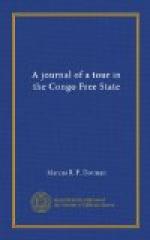The village of Ikoko consists of groups of huts separated from each other by the tall grass, which here is eighteen or twenty feet long, but as the ends bend over, not above twelve or fifteen feet high. The people seem idle, contented and happy, the chief industry being fishing and net-making. Mr. Clarke said the population used to be about 2000 in number, but many have died of Sleeping Sickness and some have migrated. This is very evident, for a number of huts are deserted, and the weeds have grown over them, in some cases entirely blocking the entrances. Out of curiosity, we have a rough census taken and find there are 138 men in the village on August 19th. Some no doubt are fishing, and allowing for these and the women and children, there are probably not more than 1000 to 1200 people now living in the village. The work these do for the State, consists of supplying 600 rations of fish per week to the plantation of Bikoro, a ration consisting of a whole, a half, or a quarter of a fish according to its size. For this they are paid 600 mitakos—or about 23/—. They also supply bamboos and baskets, but it is very plain that if the people worked hard, they would certainly not require as long as 40 hours a month to accomplish their tasks. The fish are caught in nets made of thin bamboo lashed together by a tough creeper, which are arranged in the lake. Sometimes it happens that the fishermen are unfortunate and then they buy from their neighbours who take advantage of the scarcity value and charge them more than they will receive from the State. A village might thus be out of pocket by the transaction, but as each one has its turn, probably by the end of the year no one has lost or gained.
In the Mission school men, women, and children are learning to read and write the native language, and some have mastered also the rudiments of arithmetic and French. Some of the classes are held in the school-room and others under trees near at hand. An assistant missionary, Mr. Whitman, helps Mr. Clarke, while Mrs. Whitman teaches in the school.
On August 20th we start for Bikoro under a threatening sky. It is indeed soon apparent that a tornado is crossing the Lake towards us, for great banks of dense clouds advancing rapidly from the south west now obscure the sun. It would be impossible to travel through the storm, so we turn the boat and make for a creek which bounds Ikoko on the east. Only just in time, we reach a native hut, as a terrific storm bursts overhead. The rain descends in sheets accompanied by vivid green lightning and crashes of thunder. Fortunately the roof is water-tight, but the mud floor of the hut has worn down below the level of the ground outside and soon the water pours through the door and is nine or ten inches deep inside. The fire splutters out and the logs float around amid the crowing of fowls and the cackling of ducks who are quite contented and happy. Our hostess with a baby strapped on her back in the usual native fashion, commences to bale out the water with a basket while we sit on logs in the darkness and try to keep dry. After about an hour the storm passes and we go back to the Mission, the Lake now appearing like a small sea.




